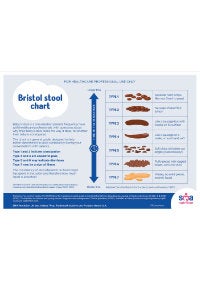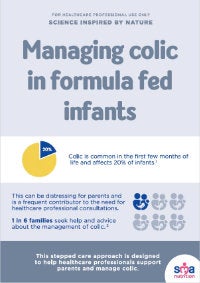The Crying Infant: Identifying baby colic and constipation
Overview
In the first few weeks and months of an infant’s life, mild digestive disorders like colic, constipation, wind or crying are common and can be distressing for parent and baby.1 A newborn may commonly have multiple gastrointestinal symptoms.2
1 in 6 families seek help and advice about managing colic in babies3 and these mild digestive disorders are a frequent contributor to the need for healthcare professional consultations.
Identifying Colic
Infantile colic is a self-limiting condition which is defined clinically as repeated episodes of excessive and inconsolable crying in an infant that otherwise appears to be healthy and thriving4
Rome IV Diagnostic criteria for infantile Colic5
- An infant aged <5 months when the symptoms start and stop
- Recurrent and prolonged periods of crying, fussing or irritability reported by parents (caregivers) that occur without obvious cause and cannot be prevented or resolved by parents or caregivers
- No evidence of infant faltering growth, fever or illness
For more information on the causes, remedies, management of infant colic click here.
Identifying Constipation
Rome IV Diagnostic criteria for functional constipation5
Must include 1 month of at least two of the following in infants up to four years of age:
- Two or fewer stools per week
- History of excessive stool retention
- History of painful or hard bowel movements
- History of large diameter stools
- Presence of a large faecal mass in the rectum
- Other signs may include, amongst others: excessive wind, soiling or overflow, distention or discomfort6
For advice on managing constipation, click here
For formula fed babies with colic or constipation, the new SMA® Comfort offers a unique combination of ingredients specifically designed for the dietary management of colic and constipation. Find out more.
Baby symptom tracker
Use the link below to download our baby symptom tracker
This 24-hour diary for symptoms is designed to aid parents / caregivers in keeping track of baby’s symptoms when the baby has feeding issues or crying-related symptoms. Using this tracker to keep an accurate record of a baby’s symptoms / events and sharing it with a healthcare professional may help with accurate diagnosis.
Related articles
-
Vandenplas Y et al. JPGN 2015 (61); 5: 531–537
-
Bellaiche M, et al. Multiple functional gastrointestinal disorders are frequent in formula-fed infants and decrease their quality of life. Acta Paediatr. 2018;107(7):1276-1282. doi:10.1111/apa.14348
-
Drug and Therapeutics Bulletin. Management of Infantile Colic [Online]. 2013. Available At: http://dtb.bmj.com/content/51/1/6.full.pdf+html (Accessed March 2021)
-
NICE (2015) Postnatal care up to 8 weeks after birth. National Institute for Health and Care Excellence. Available at https://www.nice.org.uk/guidance/cg37 (Accessed March 2021)
-
Benninga M et al. Gastroenterology 2016;150: 1443–1455. 6. NICE (2017). CG99:Constipation in children and young people: diagnosis and management. Available at https://www.nice.org.uk/guidance/cg99 (Accessed March 2021)
-
NICE (2017). CG99:Constipation in children and young people: diagnosis and management. Available at https://www.nice.org.uk/guidance/cg99 (Accessed March 2021)
IMPORTANT NOTICE:
The World Health Organisation (WHO) has recommended that pregnant women and new mothers be informed on the benefits and superiority of breastfeeding – in particular the fact that it provides the best nutrition and protection from illness for babies. Mothers should be given guidance on the preparation for, and maintenance of, lactation, with special emphasis on the importance of a well-balanced diet both during pregnancy and after delivery. Unnecessary introduction of partial bottle-feeding or other foods and drinks should be discouraged since it will have a negative effect on breastfeeding. Similarly, mothers should be warned of the difficulty of reversing a decision not to breastfeed. Before advising a mother to use an infant formula, she should be advised of the social and financial implications of her decision: for example, if a baby is exclusively bottle-fed, more than one can (400 g) per week will be needed, so the family circumstances and costs should be kept in mind. Mothers should be reminded that breast milk is not only the best, but also the most economical food for babies. If a decision to use a formula is taken, it is important to give instructions on correct preparation methods, emphasising that unboiled water, unsterilised bottles or incorrect dilution can all lead to illness. This product must be used under medical supervision. SMA® Comfort is a special formula intended for the dietary management of bottle-fed babies with colic and constipation. It is suitable as the sole source of nutrition up to 6 months of age, and in conjunction with solid food up to 12 months of age.






